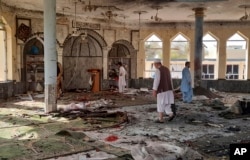ອົງການທີ່ປຶກສາຂອງສະຫະລັດກ່າວວ່າ ອັຟການິສຖານຄວນຖືກຈົດເຂົ້າໃນບັນຊີລາຍຊື່ ຂອງຜູ້ລະເມີດສິດເສລີ ພາບທາງສາສະໜາ ທີ່ຮ້າຍແຮງທີ່ສຸດໃນໂລກ. ຄະນະກຳມາທິການສະຫະລັດກ່ຽວກັບເສລີພາບທາງສາດສະໜາສາກົນໄດ້ອອກຄຳແນະນຳດັ່ງກ່າວ ໃນບົດລາຍງານປະຈຳປີ ທີ່ຫາກໍ່ເຜີຍແຜ່ອອກມາຂອງຕົນ. ບົດລາຍງານນັ້ນເວົ້າວ່າ ພວກສະໜາກຸ່ມນ້ອຍໄດ້ຮັບຄວາມລຳບາກໃຈ ນັບຕັ້ງແຕ່ກຸ່ມຕາລີບານໄດ້ກັບຄືນມາກຳອຳນາດ ໃນປີກາຍນີ້. ຄະນະກໍາມາທິການສາ ມາດໃຫ້ແຕ່ຄໍາແນະນໍາເທົ່ານັ້ນ. ຄະນະກໍາມາທິການດັ່ງກ່າວໄດ້ແນະນຳໃຫ້ຈັດເອົາທັງໝົດ15 ປະເທດເຂົ້າໄປໃນບັນຊີ "ປະເທດທີ່ໜ້າເປັນຫ່ວງພິເສດ" ສຳ ລັບການລະເມີດເສລີພາບທາງສາສະໜາ. ກະຊວງການຕ່າງປະເທດຂອງສະຫະລັດເປັນຜູ້ຕັດສິນໃຈຂັ້ນສຸດທ້າຍວ່າ ປະເທດໃດ ຄວນຖືກຈັດເຂົ້າໄປໃນບັນຊີລາຍຊື່ອັນນັ້ນ, ອີງຕາມລາຍງາຍຂອງອົງການຂ່າວເອພີ ຫລື Associated Press.
ອ່ານຂ່າວນີ້ເພີ້ມເປັນພາສາອັງກິດຢູ່ຂ້າງລຸ່ມນີ້:
A U.S. advisory body says Afghanistan should join a list of the world's worst violators of religious freedom. The U.S. Commission on International Religious Freedom made the recommendation in its newly released annual report. It says religious minorities have suffered since the Taliban returned to power last year. The commission can only make recommendations. The commission is recommending 15 countries in total be listed as "countries of particular concern" for religious freedom violations. The U.S. State Department makes the final determination for which countries go on that list.
For web: Afghanistan should join a list of the "worst of the worst" violators of religious freedom in the wake of the Taliban's return to power, a U.S. advisory body is recommending to the State Department.
In its annual report issued Monday, the U.S. Commission on International Religious Freedom says religious minorities have "faced harassment, detention and even death due to their faith or beliefs" since the Taliban reimposed its harsh interpretation of Sunni Islam on Afghanistan. It also cited attacks on religious minorities by an Islamic State affiliate that is an enemy of the Taliban.
Afghanistan is among 15 nations that the commission says should be on the State Department's list of "countries of particular concern." The commission, in its report summary, defined these governments as the "worst of the worst" in tolerating or engaging in "systematic, ongoing and egregious violations of religious freedom."
The commission, created in 1998 under the International Religious Freedom Act, makes nonbinding policy recommendations to the administration and Congress. The State Department has adopted some but not all of its recommendations in the past.
In the new report, the commission recommends maintaining 10 countries currently on the State Department list, including China, Eritrea, Iran, Myanmar, North Korea, Pakistan, Russia, Saudi Arabia, Tajikistan and Turkmenistan.
It also recommends adding four more in addition to Afghanistan — India, Nigeria, Syria and Vietnam. The commission criticized the Biden administration for removing Nigeria from the list last year.
The report said that in Afghanistan, many minority Jewish, Hindu and Sikh residents have fled the country after the Taliban returned to power. It said many members of other religious minorities, such as Ahmadiyya Muslims, Baha'is and Christian converts are worshipping in secret for fear of persecution.
Many religious minorities fled Afghanistan out of fear for what could happen under the Taliban, rather than in response to specific actions or edicts issued by the Taliban.
Some Sikhs still live and worship in Kabul, and the report notes that Taliban representatives visited a Sikh gurdwara or house of worship to assure them of their safety. But the report said many Sikhs and Hindus have fled to India "due to the lack of safety and security."
The commission also cited a Human Rights Watch report of the Taliban attacking and seizing property of ethnic Hazaras belonging to the Shiite Muslim minority, plus an Amnesty International report of a Taliban massacre of Hazara men in 2021.
Several deadly attacks on Hazaras have been attributed to Islamic State in Khorasan Province or IS-K, which is hostile to the Taliban and has proven to be an intractable security challenge. The cover of the commission's report includes a photo of a deadly attack by IS-K on a Shiite mosque last year in Kunduz province.
The report echoes CIA World Factbook data from 2009, which said non-Muslim Afghans comprised a tiny fraction of the population. It said 99.7% of Afghans are Muslim, most of them Sunni Muslims, with about 10% to 15% Shiite Muslims.





